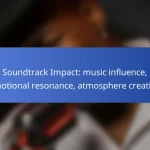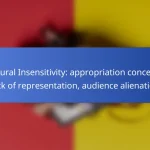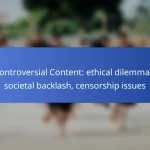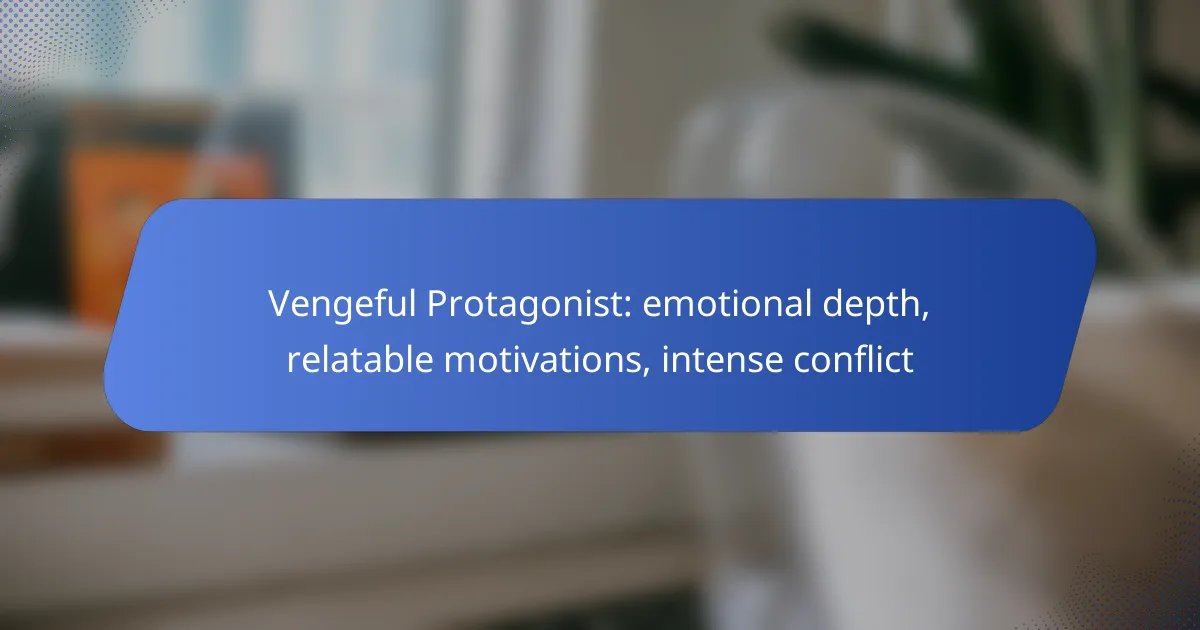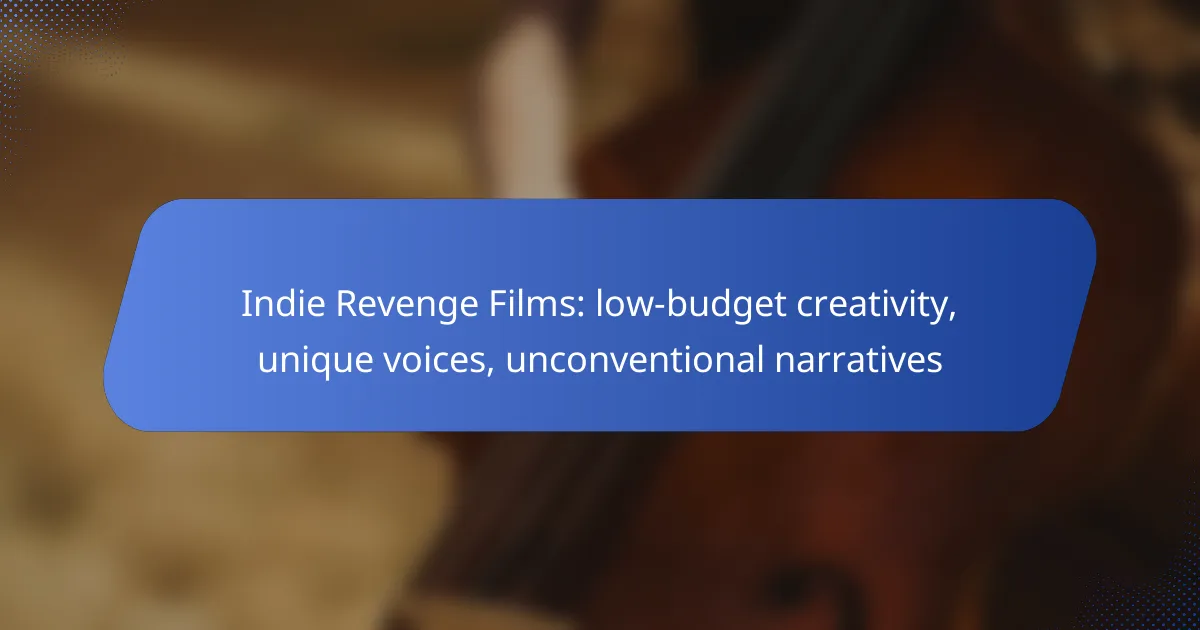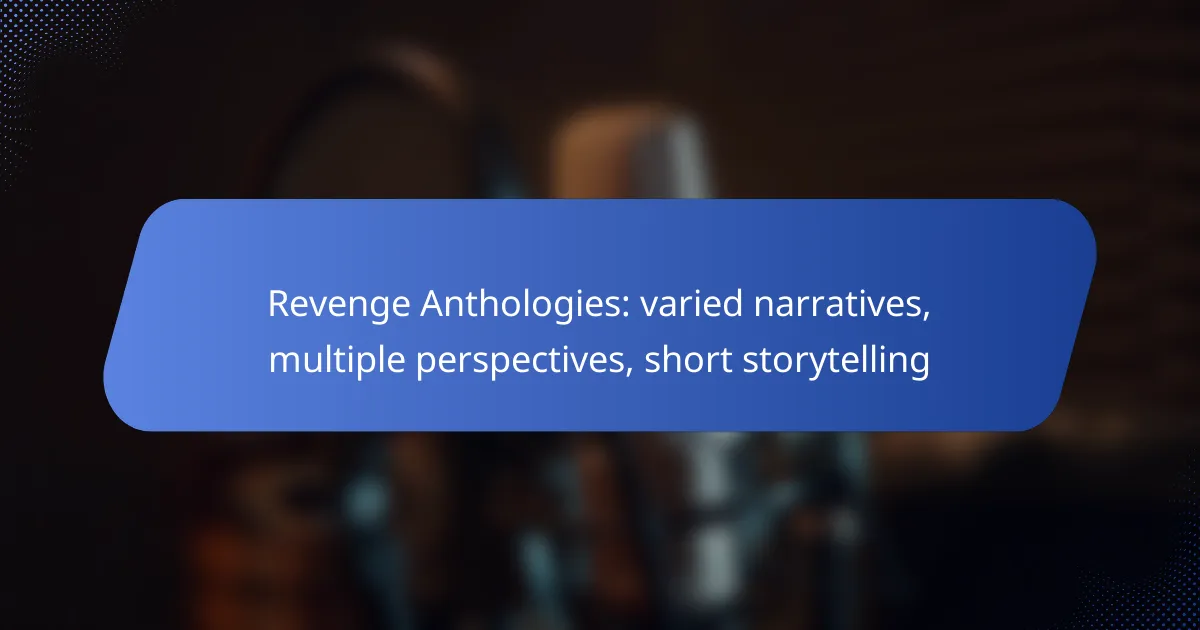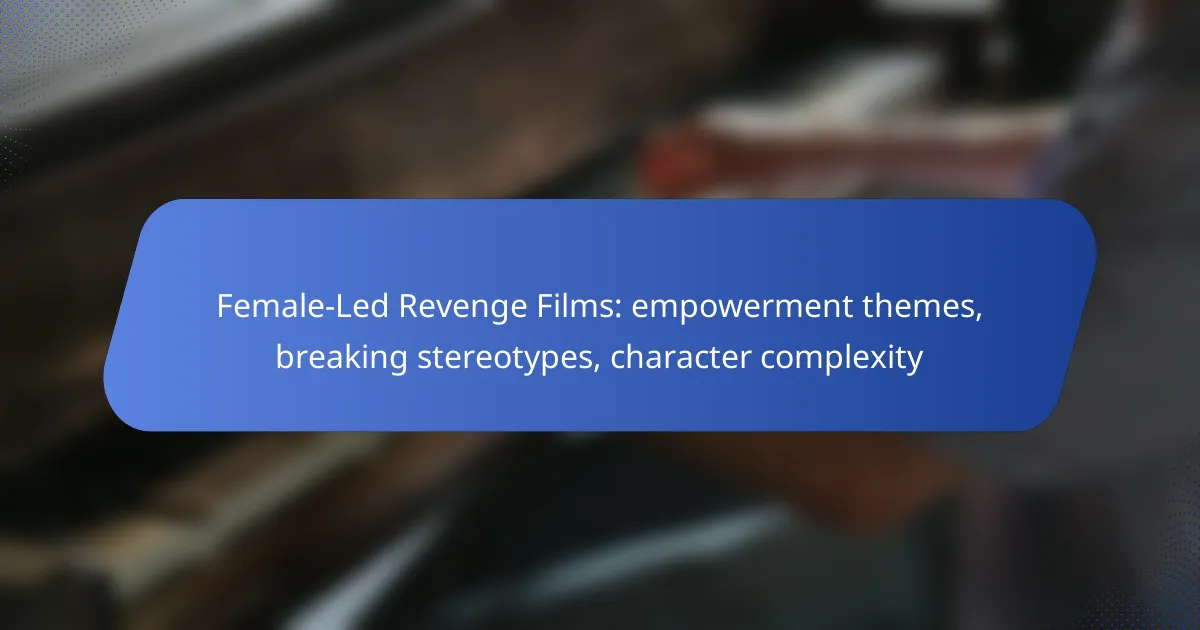Vengeful protagonists are rich with emotional depth, as their motivations often arise from profound personal losses and injustices. This quest for revenge not only fuels intense conflicts but also creates a compelling narrative that resonates deeply with audiences, making the characters’ journeys relatable and impactful.

How do vengeful protagonists create emotional depth?
Vengeful protagonists create emotional depth by embodying complex motivations that resonate with audiences. Their quests for revenge often stem from profound personal losses or injustices, making their journeys relatable and emotionally charged.
Complex backstories
Vengeful protagonists typically have intricate backstories that explain their motivations. These narratives often include traumatic events, such as the loss of a loved one or betrayal by a trusted ally, which serve as catalysts for their desire for revenge. For instance, a character who lost a family member to violence may seek retribution against those responsible, adding layers to their emotional journey.
These backstories not only provide context but also invite empathy from the audience. Understanding the character’s past helps viewers connect with their pain and justifications, making their actions more impactful.
Relatable human experiences
Vengeful protagonists often reflect relatable human experiences, such as grief, anger, and the struggle for justice. These emotions are universal, allowing audiences to see parts of themselves in the characters’ quests. For example, a character seeking revenge for a wrongful conviction can resonate with anyone who has felt powerless in the face of injustice.
This relatability enhances the emotional depth of the narrative, as viewers may find themselves rooting for the protagonist despite their morally ambiguous actions. The struggle between right and wrong becomes a compelling exploration of human nature.
Inner conflicts
Inner conflicts are a hallmark of vengeful protagonists, adding complexity to their character arcs. They often grapple with the morality of their actions, questioning whether revenge will truly bring them peace or simply perpetuate a cycle of violence. This internal struggle can manifest in moments of doubt or hesitation, making the character’s journey more nuanced.
For instance, a character may find themselves torn between their desire for vengeance and the potential consequences for innocent bystanders. These conflicts not only deepen the character’s emotional landscape but also engage the audience in a dialogue about the nature of justice and redemption.
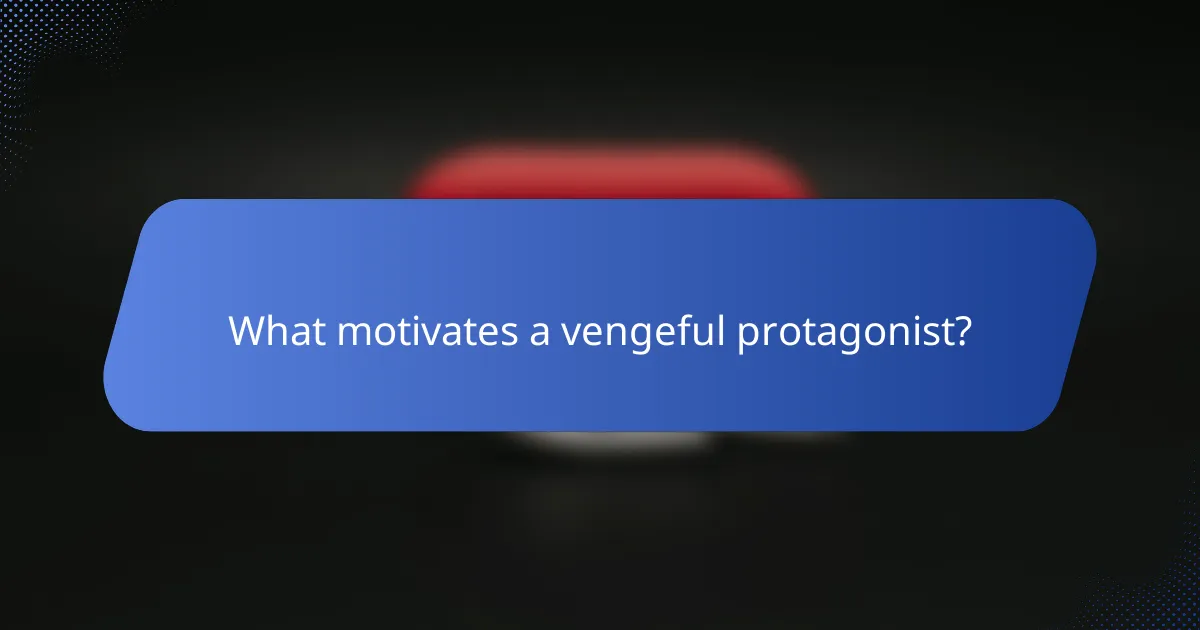
What motivates a vengeful protagonist?
A vengeful protagonist is typically driven by deep emotional wounds, often stemming from personal loss, perceived injustices, or a longing for redemption. These motivations create intense conflicts that resonate with audiences, making the character’s journey relatable and compelling.
Loss of loved ones
The loss of loved ones is a powerful motivator for vengeance, often serving as the catalyst for a protagonist’s quest. This emotional pain can stem from tragic events such as murder, betrayal, or abandonment, leading the character to seek retribution against those responsible.
For instance, a character who loses a family member to violence may become consumed by grief, driving them to confront their loved one’s killer. This pursuit of vengeance can manifest in various ways, from calculated plans to impulsive actions, reflecting the character’s emotional turmoil.
Injustice faced
Experiencing injustice can ignite a strong desire for revenge, particularly when the protagonist feels powerless or victimized. This motivation often arises from societal or personal wrongs, such as discrimination, betrayal by trusted allies, or legal injustices.
For example, a character wrongfully imprisoned may seek vengeance against the system that failed them. Their journey often highlights themes of resilience and the struggle for justice, making their motivations relatable to those who have faced similar challenges.
Desire for redemption
A desire for redemption can also drive a vengeful protagonist, as they seek to atone for past mistakes or failures. This motivation often intertwines with vengeance, as the character believes that avenging a wrong can restore their sense of honor or integrity.
For instance, a character who has previously harmed others may embark on a quest for revenge against those who wronged them, believing that achieving justice will cleanse their conscience. This dual motivation adds layers of complexity to their actions, making their journey more compelling and emotionally charged.
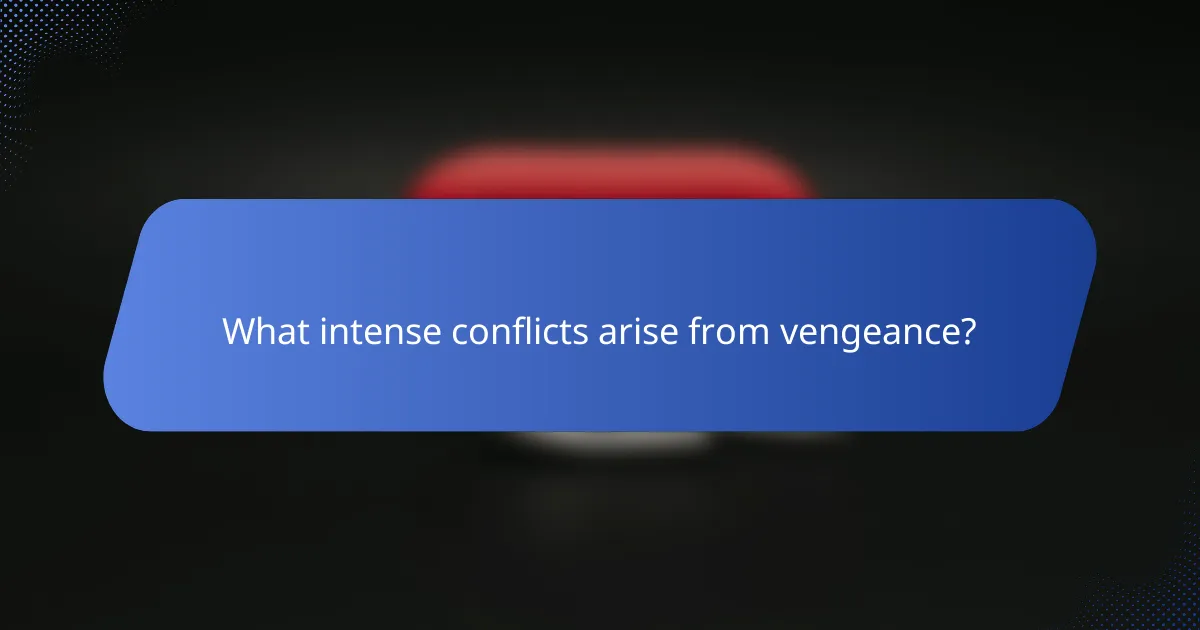
What intense conflicts arise from vengeance?
Vengeance often leads to intense conflicts that can manifest in various forms, including personal rivalries, internal dilemmas, and broader societal issues. These conflicts create a complex web of emotional depth and relatable motivations that drive the narrative forward.
Man vs. man conflicts
Man vs. man conflicts arise when a vengeful protagonist seeks retribution against an antagonist, often leading to direct confrontations. These conflicts can escalate into physical battles, psychological warfare, or strategic maneuvers, highlighting the protagonist’s determination and the antagonist’s resistance.
For example, a character wronged by a business rival may engage in sabotage or legal battles, showcasing the lengths they will go to achieve their revenge. The intensity of these conflicts often reflects the personal stakes involved, making them relatable to the audience.
Internal struggles
Internal struggles are a significant aspect of a vengeful protagonist’s journey, as they grapple with their motivations and the moral implications of their actions. This conflict can manifest as guilt, doubt, or a longing for redemption, creating emotional depth that resonates with readers.
For instance, a character seeking vengeance may question whether their actions will truly bring satisfaction or merely perpetuate a cycle of violence. This internal turmoil can lead to moments of introspection, allowing for character growth and a deeper connection with the audience.
Societal repercussions
The quest for vengeance can have far-reaching societal repercussions, affecting not only the protagonist and antagonist but also innocent bystanders and the community at large. These repercussions can include escalating violence, legal consequences, and shifts in public perception.
For example, a personal vendetta may lead to a public scandal, drawing media attention and impacting the reputations of those involved. This broader context emphasizes the idea that revenge can disrupt social harmony, raising questions about justice and morality within the narrative.
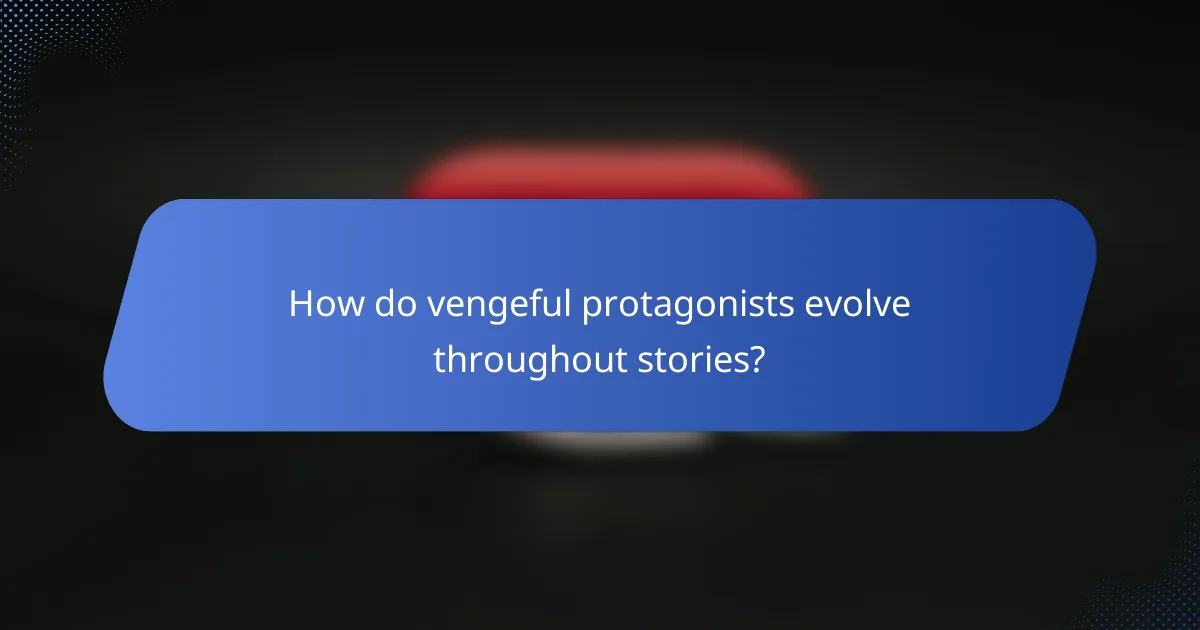
How do vengeful protagonists evolve throughout stories?
Vengeful protagonists often undergo significant evolution as they navigate their quests for retribution. Their journey typically involves deep emotional struggles, relatable motivations, and intense conflicts that shape their character and decisions.
Character arcs
Character arcs for vengeful protagonists usually follow a trajectory from anger and pain to self-discovery and resolution. Initially, they may be consumed by their desire for revenge, which can lead to destructive behavior. As the story progresses, they often confront their motivations and the consequences of their actions, leading to growth and transformation.
For example, a character seeking vengeance for a lost loved one might start as a ruthless avenger but gradually learn the value of forgiveness or the futility of their quest. This evolution can create a more complex, relatable character that resonates with the audience.
Moments of realization
Key moments of realization are pivotal in the evolution of vengeful protagonists. These moments often occur when the character faces the consequences of their actions or encounters someone who challenges their worldview. Such realizations can lead to a shift in their motivations, prompting them to reconsider their path.
An effective moment of realization might involve a confrontation with an innocent party affected by their quest for revenge, forcing the protagonist to reassess their choices. These turning points are crucial for deepening emotional engagement and driving the narrative forward.
Consequences of actions
The consequences of a vengeful protagonist’s actions often serve as a catalyst for their evolution. Their pursuit of revenge can lead to collateral damage, affecting not only their enemies but also their allies and themselves. This ripple effect can create moral dilemmas that challenge their initial motivations.
For instance, a character might achieve their revenge but at a great personal cost, such as losing a friend or compromising their values. These consequences can lead to a powerful narrative arc where the protagonist must grapple with the aftermath of their choices, ultimately shaping their character and future decisions.
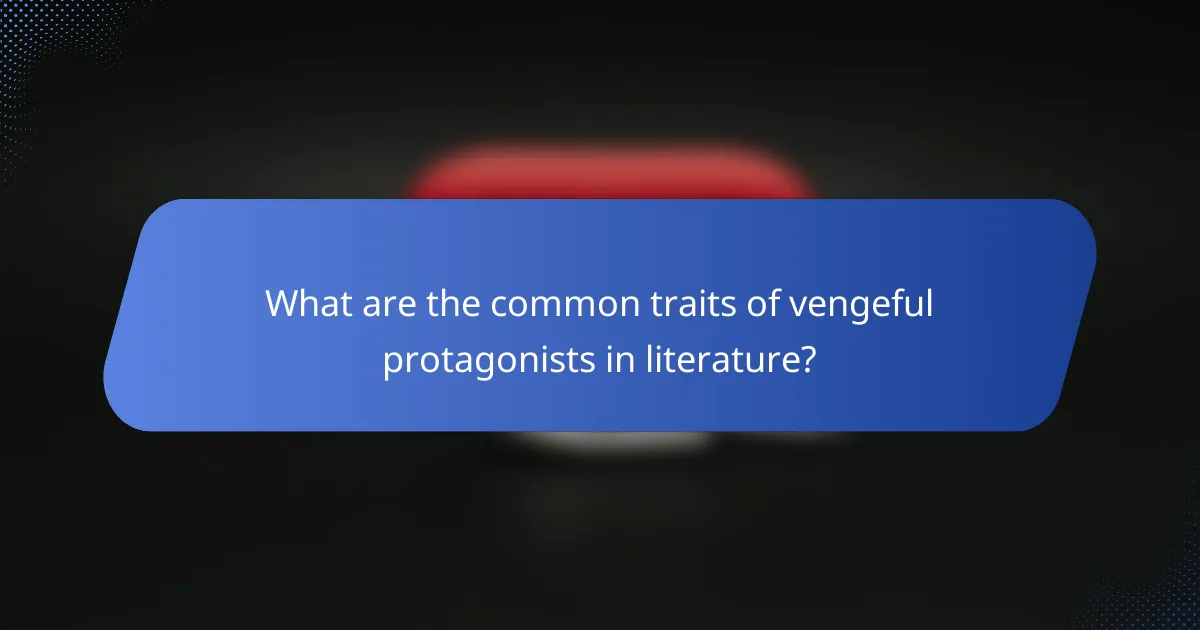
What are the common traits of vengeful protagonists in literature?
Vengeful protagonists often share traits such as determination and flawed morality, which drive their actions and create intense conflict. These characters are typically motivated by personal loss or betrayal, leading them to pursue revenge at any cost.
Determination
Determination is a hallmark of vengeful protagonists, propelling them toward their goals with relentless focus. This trait manifests as an unwavering commitment to achieving revenge, often overriding their moral compass and rational judgment.
For example, characters like Edmond Dantès in “The Count of Monte Cristo” showcase extreme persistence, meticulously planning their revenge over many years. This determination can lead to both triumph and tragedy, as the quest for vengeance often consumes their lives.
Flawed morality
Flawed morality is another significant trait, as vengeful protagonists often operate outside conventional ethical boundaries. Their sense of justice is skewed, justifying harmful actions against those they perceive as wrongdoers.
In literature, this can be seen in characters like Walter White from “Breaking Bad,” whose descent into criminality stems from a desire to protect his family, yet results in devastating consequences. Readers may empathize with their motivations but are also challenged to confront the moral complexities of their choices.
